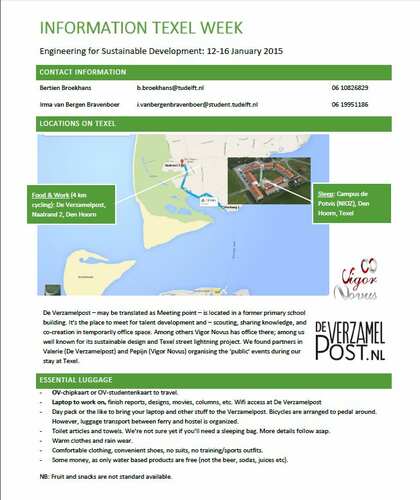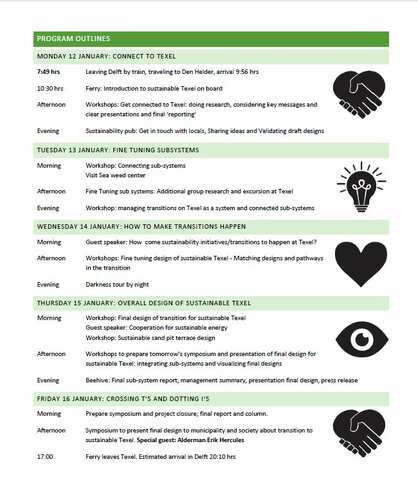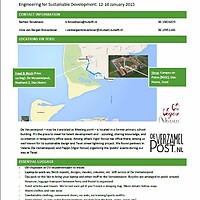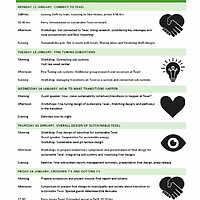Date: Tuesday December 16th, 2014
Time: 13:30-17:30
Place: Yes!Delft & TPM
Topic: Engineering for Sustainable Development
Learning objective: We have to consider what contribution we as an Delft engineer we can and want to make.
1 Introduction
The meeting on Tueasday December 16th was set on the topic of Engineering for Sustainable Development. How can me as a Delft engineer make a difference. We have to consider what contributions we can and want to make.
For the first part of the meeting we visited YES!Delf. YES!Delft inspires students, professionals and scientists to make their first steps on the path to becoming an entrepreneur and offer them the necessary support to turn their enterprise into a ‘leading firm’. We got a guided tour through the building and three start-up give a short presentation about their company. In the second part of the meeting we discussed resilient leadership under the guidance of moTiv. In the last part of the meeting we celibrated the end of the meetings with some drinks and snacks, while the preliminary program of the Texel week was presented to us.
2 Visit YES!Delft
YES!Delft is the high-tech entrepreneurs centre with a clear mission: we build tomorrow’s leading firms. They inspire students, professionals and scientists to make their first steps on the path to becoming an entrepreneur and offer them the necessary support to turn their enterprise into a ‘leading firm’. YES!Delft focuses on companies with a technological, innovative and scalable product or process. To get a better idea of the ideas and the working methods of YES!Delft we got a guided tour through the building. Three entrepreneurs presented their experiences of starting up a new business to us. Two of them were YES!Delft companies and the last one is starting up its own business. Within the presentation they explained us their experiences of making a contribution to sustainability.
2.1 Start-up presentations
2.1.1 Flexous
FLEXOUS enables efficient and reliable vibration energy harvesters for wireless sensors. There is a hidden source of energy around us which has not been sufficiently explored to date. Mechanical energy from ambient vibration or human motion can be converted into electric energy by using a device referred to as an “energy harvester”. This technique offers lifelong power supply for low-power electronics such as wireless-sensors. Existing energy harvesters tend to perform poorly under most real life conditions. Flexous breaks this limitation of energy harvesting industry by increasing efficiency and broadening the range of harvested frequencies. Flexous aims to establish our energy harvester as a standard within the industry.
See more at: http://www.flexous.com/en/
2.1.2 aQysta
aQysta’s Barsha pump is a low-cost, innovative solution for small- and medium sized farmers to irrigate their fields without using any fuel or electricity to do so. The hydro-powered pump easily implemented anywhere where there is flowing water nearby and requires very little maintenance. Furthermore, by doubling yields by proper irrigation, Barsha will pay back for itself within 18 months.
aQysta is on a Quest to make the future a brighter one for people around the globe. Since water is the essential ingredient of both life and civilization, this is where they start. By developing essential products that truly have the potential to impact the lives of people on a global scale, we want to create a people-centered business. Rather than providing things for free, they aim to include our target audience in all aspects of our process in order to create products of real value that instill a sense of pride of ownership and responsibility in our customers. To them, this kind of empowerment is what drives development.
See more at: http://www.aqysta.com
2.1.3 24 Home
24-Home is an innovative Dutch company which designs and produces affordable prefab houses of Dutch quality. 24-Home houses are produced under the best conditions in advanced factories. The production system of the houses is innovative and sustainable. It guarantees a competitive price, flexibility and a high quality. Because of various options in size and finishing, countless combinations for a 24-Home house are possible. In this way, 24-Home believes in a fast and sustainable way of building in order to fulfill the need for housing all over the world.
See more at: http://www.24-home.nl
2.2 Conclusion visit YES!Delft
It was really inspiring to hear the start-ups talking about their companies. The most important lesson we learned from the presentations is to believe in your idea to make it happen. YES!Delft is willing to help you developing your ideas into a leading firm. All three companies had an idea to make the world a bit better or easier and by believing in this idea they made it happen. They don’t know what the future will bring them, but they want to keep developing their products. For Texel this means that we must believe in our ideas to make it happen. Feel inspired by the transitions that are already happening on the island.
3 Discussion resilient leadership
The group was split up in two groups to discuss about resilient leadership under guidance of moTiv. MoTic is a center for life and career development in Education and business at the Delft University of Technology. They focus on the practical values of meaning and motivation in science and technology. They provide both students and professionals with meaning and motivation to challenge and stimulate personal and professional growth, leading you to a better understanding of your creative and innovative powers, giving way to the existential pleasures of engineering.
3.2 Resilient leadership
First discussed in a group of 6 students our thoughts about leadership in general. We think a good leader have to possess a range of qualities; He needs to have an overview and a vision, he needs to get the group together, get to know the group and see the individual qualities.
After the first part of the discussion we had to choose 2 quotes from a stack of cards, which we think are part of resilient leadership. Afterwards we had to explain why we think these quotes are a part of resilient leadership and answer the personal questions at the backside of a card. Two quotes that were mentions within our group:
- There is a piece of heaven for everyone if we don’t make it a hell.
- Patience builds a bridge over the deepest waters.
Question at the backside: when do you need patience in your dealings with others?
The quotes in our group could be categorized in the following categories:
- Communication & change
- Relationship & relationship
- Personal development & communication
- Leadership & change
- Personal development & leadership
- Relationship & giving meaning
After answering the questions with a personal example motive told us more about leadership. What do current global leaders expect? There are four categories in which a leader should react. These categories constitute together the role of a leader.
- Context: Understanding key issues and being able to think strategically about how to respond.
- Complexity: Having the skills to survive and thrive in situations of low certainty and low agreement
- Connectedness: The ability to understand actors in the wider political landscape and to engage and build effective relationships with new kinds of internal and external partners.
- Change: Understanding and working effectively with the dynamics of change.
MoTiv explained to us that you can divide different leadership styles into four categories:
Supporting, couching, empowering and directing. Each style has its own pros and cons. Each individual is different and, therefore, will appreciate another type of leadership. Which type of leadership would you prefer?
After a short discussion about which kind of leadership we would prefer the discussion become more personal. We had to fill in what kind of personal characteristics we have in the area of resilient leadership and explain this on the basis of a personal experience.
|
Responsiveness Planning Compassion Positive identity Initiative Spirituality Educational aspirations Caring Resistance Optimism Mindfulness Altruism |
Goal direction Achievement Motivation Faith Humor Communication Self-awareness Adaptive Distancing Creativity Forgiveness Sense of meaning |
Flexibility Resourcefulness Empathy Mastery Self-efficacy Special interest Insight Critical Thinking Imagination Hope Internal locus of control
|
All these characteristics could be divided into four categories, Social competence, Problem solving, autonomy and sense of purpose.
|
Social competence |
Problem solving |
Autonomy |
Sense of purpose |
|
Responsiveness Communication Empathy Caring Compassion Altruism Forgiveness |
Planning Flexibility Resourcefulness Critical thinking Insight |
Positive identity Internal locus of control Initiative Self-efficacy Mastery Adaptive Distancing Resistance Self-awareness Mindfulness Humor |
Global direction Achievement Motivation Educational aspiration Special interest Creativity Imagination Optimism Hope Faith Spirituality Sense of meaning |
Remarkable was that the category of social competence was less represented than the other three categories. Perhaps because these characteristics are close to you, without noticing.
3.2 Conclusions on resilient leadership
During second part of the meeting we learned more about resilient leadership and which types of leaderships are possible. The discussion that took place was quite personal because of the openness of the group. As a result it became clear to everyone that leadership is different for each individual. Everyone has its own interpretation and has different qualities as a resilient leader. This awareness was one of the most important lessons we learned this afternoon. It is important to reflect on you self and to understand which kind of leader you would prefer and which kind of leader you would be. This is also an important question we can ask our self in relation to the Texel case. What kind of leadership would be preferred on Texel in order to start a new transition.
4 Drinks & program of the Texel week
After the serious work, we went downstairs to have a drink together. The staff brought all kinds of snacks to celebrate this last meeting. When everyone was provided with a drink, the preliminary program of the Texel week was presented to us. See images for more information about the program of the Texel week.






